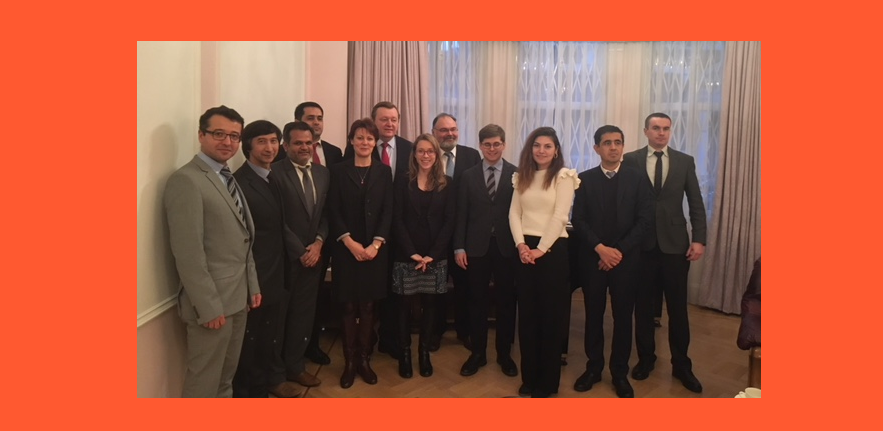
Submitted by P. Kalra on Thu, 10/05/2018 - 12:47
Press Release:
The University of Kent, along with its partners – Cambridge University, ADA University, Belarusian State University, Tajik National University, and University of World Economy and Diplomacy in Uzbekistan – has announced the launch date of the prestigious Global Challenges Research Fund (GCRF) “COMPASS” Project (ES/P010849/1; 2017-21), on 22-23 May 2018, Minsk, Belarus.
The programme for the event is available here: https://research.kent.ac.uk/gcrf-compass/wp-content/uploads/sites/169/2018/05/COMPASS-Launch-Programme.-final-draft.pdf
The project aims to build partnerships and help develop capacity in research, policy and public impacts, at the top-level higher education institutions in Eastern Europe and Central Asia. GCRF COMPASS belongs to the 1st generation the Global Challenges Research Fund (GCRF) – a £1.5 billion initiative announced by the UK government in late 2015, to support cutting-edge research that address the challenges faced by developing countries across the world.
The COMPASS project is led by the University of Kent. In partnership with Cambridge, they aim to assist prominent universities in Azerbaijan (ADA University), Belarus (Belarusian State University), Tajikistan (Tajik National University) and Uzbekistan (University of World Economy and Diplomacy), in enhancing joint research and policy impact capacities, developing public platforms, and integrating into a wider European and global scholarly communities.
The project has been warmly welcomed by our partners, who say:
‘This is such a timely project. We are just developing our research activities, and partnership with the COMPASS institutions will play a significant role in this development’ – Nargiz Ismayilova, National Team Leader, ADA University.
‘COMPASS will help Belarusian State University (BSU) to thrive and develop itself as the centre of excellence in achieving our institutional goals. COMPASS will also help to promote BSU internationally, and more specifically, develop lasting relationship with the UK!’ – Dr Artsiom Nazaranka, National Team Leader, BSU
‘This project is oriented to release the community from its cultural isolation. Tajikistan, with its economic difficulties, migration, and broken cultural infrastructure, is ready to tackle the issues of governance through research, policy and community engagement’ – Professor Munira Shahidi, National Team Leader, TNU
‘Participation in this unique project gives a unique opportunity to enrich our experience, establish stable cooperation with UK universities and regional partners, and contribute to develop a long-term scientific capacity of our university, and across the country’ – Dr Akram Umarov, National Team Leader, UWED
With the endorsement of our partners, the project seeks to establish ‘regional hubs of excellence’ across the eastern region and Central Asia, to enable them to become internationally recognised. This will create ‘nodes of excellence’ for knowledge production and transfer across the region and beyond. In the pursuit of this goal, the project will follow a two strategic approaches.
Conceptually, it will explore new approaches to ‘governance’ (as order formation) with a focus on community, peoplehood, identity, and order – domestically and internationally - to make governance more effective and sustainable.
Practically, the project will seek to enhance relations between the UK and partner universities, and to develop cooperation along the following three dimensions:
- Research integration to identify specialist research niche for partner institutions, organise thematic workshops and conferences, produce agreed academic outputs; deliver international training schools for Early Career Researchers, and launch a series of pilot projects as part of the wider UK/EU research integration strategy
- Policy impact to identify training needs for continuing professional development in partner institutions, organise study trips to the UK and EU (e.g. London Forum in January 2019), deliver Executive Summer Schools, and establish regular top-level regional policy forums for policy impact and better knowledge of the region – e.g. Minsk Dialogue; Gender and Education in Baku; Eurasian Identity in Dushanbe; the Silk Road Initiative in Tashkent; Parliamentary Cooperation across the region and the Caspian Energy Security in Baku
- Sustainable communities to explore the notions of ‘peoplehood’, ‘community resilience’ and a ‘sense of good life’ for local communities; identify core public needs for more effective governance; organise school fairs with study packs, citizen juries and televised debates to raise public awareness and improve governance performance
We are also excited to announce the expansion of our research team at Kent, to include two prospective GCRF PhD funded places, and thank the School and the University for their institutional support and further investment.
